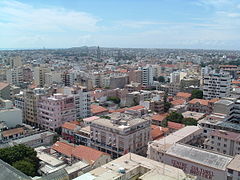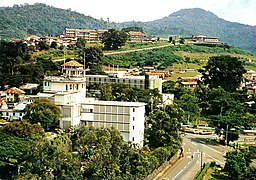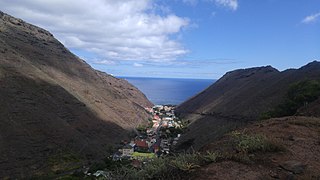
West Africa
West Africa or Western Africa is the westernmost region of Africa. The United Nations defines Western Africa as the 16 countries of Benin, Burkina Faso, Cape Verde, The Gambia, Ghana, Guinea, Guinea-Bissau, Ivory Coast, Liberia, Mali, Mauritania, Niger, Nigeria, Senegal, Sierra Leone, and Togo, as well as Saint Helena, Ascension and Tristan da Cunha (United Kingdom Overseas Territory).[8][9] The population of West Africa is estimated at 419 million[1][2] people as of 2021, and at 381,981,000 as of 2017, of which 189,672,000 were female and 192,309,000 male.[3] The region is demographically[10] and economically[11] one of the fastest growing on the African continent.
For the region of the African Union, see Regions of the African Union § West.West Africa
5,112,903 km2 (1,974,103 sq mi) (7th)
49.2/km2 (127.5/sq mi)
West African
Economic Community of West African States (ECOWAS; established 1975)
$2,500 (2013)[5]
$1,937 (2023)[6]
011 – West Africa202 – Sub-Saharan Africa002 – Africa001 – World
Early history in West Africa included a number of prominent regional powers that dominated different parts of both the coastal and internal trade networks, such as the Mali and Gao Empires. West Africa sat at the intersection of trade routes between Arab-dominated North Africa and further south on the continent, the source of specialized goods such as gold, advanced iron-working, and ivory. After European exploration encountered rich local economies and kingdoms, the Atlantic slave trade built on already existing slave systems to provide labor for colonies in the Americas. After the end of the slave trade in the early 19th century, European nations, especially France and Britain, continued to exploit the region through colonial relationships. For example, they continued exporting a number of extractive goods, including labor-intensive agricultural crops like cocoa and coffee, forestry products like tropical timber, and mineral resources like gold. Since independence, many West African countries, like Ivory Coast, Ghana, Nigeria and Senegal, have played important roles in the regional and global economies.
West Africa has a rich ecology, with strong biodiversity and several distinct regions. The area's climate and ecology are heavily influenced by the dry Sahara to the north and east, which provides dry winds during the Harmattan, as well as the Atlantic Ocean to the south and west, which provides seasonal monsoons. This mixture of climates gives West Africa a rich array of biomes, from biodiversity-rich tropical forests to drylands supporting rare and endangered fauna such as pangolins, rhinoceros, and elephants. Because of the pressure for economic development, many of these ecologies are threatened by processes like deforestation, biodiversity loss, overfishing, pollution from mining, plastics and other industries, and extreme changes resulting from climate change in West Africa.
Further information in the sections of Architecture of Africa:

















